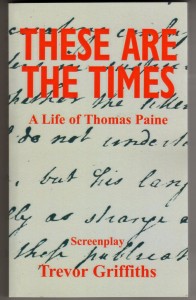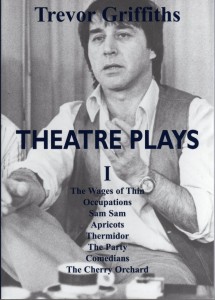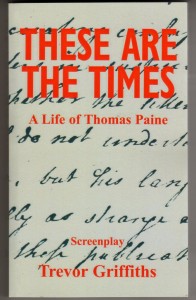These Are The Times – A Life of Thomas Paine
 A radio adaptation of this screenplay was broadcast on BBC Radio 4 as a “Saturday Play”. Part I, “Common Sense”, was broadcast on July 26th 2008 and Part II, “Age of Reason”, on August 2nd. It starred Jonathan Pryce as Thomas Paine, with Alan Howard as Benjamin Franklin, Ken Cranham as Thomas Jefferson, Philip Jackson as George Washington, François Guetary as Danton, Kelly Hunter as Marthe Daley and Romola Garai as Carnet. It was adapted for radio by Trevor Griffiths and directed by Clive Brill, with music by John Tams. The producer was Ann Scott. It will be repeated on BBC3 at a future date.
A radio adaptation of this screenplay was broadcast on BBC Radio 4 as a “Saturday Play”. Part I, “Common Sense”, was broadcast on July 26th 2008 and Part II, “Age of Reason”, on August 2nd. It starred Jonathan Pryce as Thomas Paine, with Alan Howard as Benjamin Franklin, Ken Cranham as Thomas Jefferson, Philip Jackson as George Washington, François Guetary as Danton, Kelly Hunter as Marthe Daley and Romola Garai as Carnet. It was adapted for radio by Trevor Griffiths and directed by Clive Brill, with music by John Tams. The producer was Ann Scott. It will be repeated on BBC3 at a future date.
Theatre Plays One
 Published by Spokesman Books in 2007 (www.spokesmanbooks.com)
Published by Spokesman Books in 2007 (www.spokesmanbooks.com)
The first volume of a new edition of Trevor Griffiths’ collected theatre plays, containing The Wages of Thin, Occupations, Sam Sam, Apricots, Thermidor, The Party, Comedians, The Cherry Orchard.
Theatre Plays Two
 Published by Spokesman Books in 2007. (www.spokesmanbooks.com)
Published by Spokesman Books in 2007. (www.spokesmanbooks.com)
This second volume of collected works for the theatre contains plays written from 1981 onwards: Oi for England, Real Dreams, Piano, The Gulf Between Us, Thatcher’s Children, Who Shall Be Happy…? and Camel Station.
These are the Times: A life of Thomas Paine
 An original screenplay written for Richard Attenborough but as yet unproduced.
An original screenplay written for Richard Attenborough but as yet unproduced.
published by Spokesman Books in 2005 (www.spokesmanbooks.com)
“I am reading Griffiths with envy and admiration. These Are The Times reads like the greatest of novels and is the most thrilling read I’ve had in years. It is a gorgeous pageant of American idealism, of which we have been starved during the latter half of my lifetime.” Kurt Vonnegut
“Politically searching, dramatically compelling and superbly entertaining, These Are The Times does more to retrieve one of England’s most magnificent radicals than anything that has ever been done before.” Terry Eagleton
“These Are The Times is magnificent, huge, human, an education in history, of course, but also in the human spirit.” Tom Stoppard
“A really major piece of writing which adds new meaning to the notion of the screenplay. It is a classic text, which carries great concerns forward with great humanity.” Troy Kennedy Martin
“see also Radio

